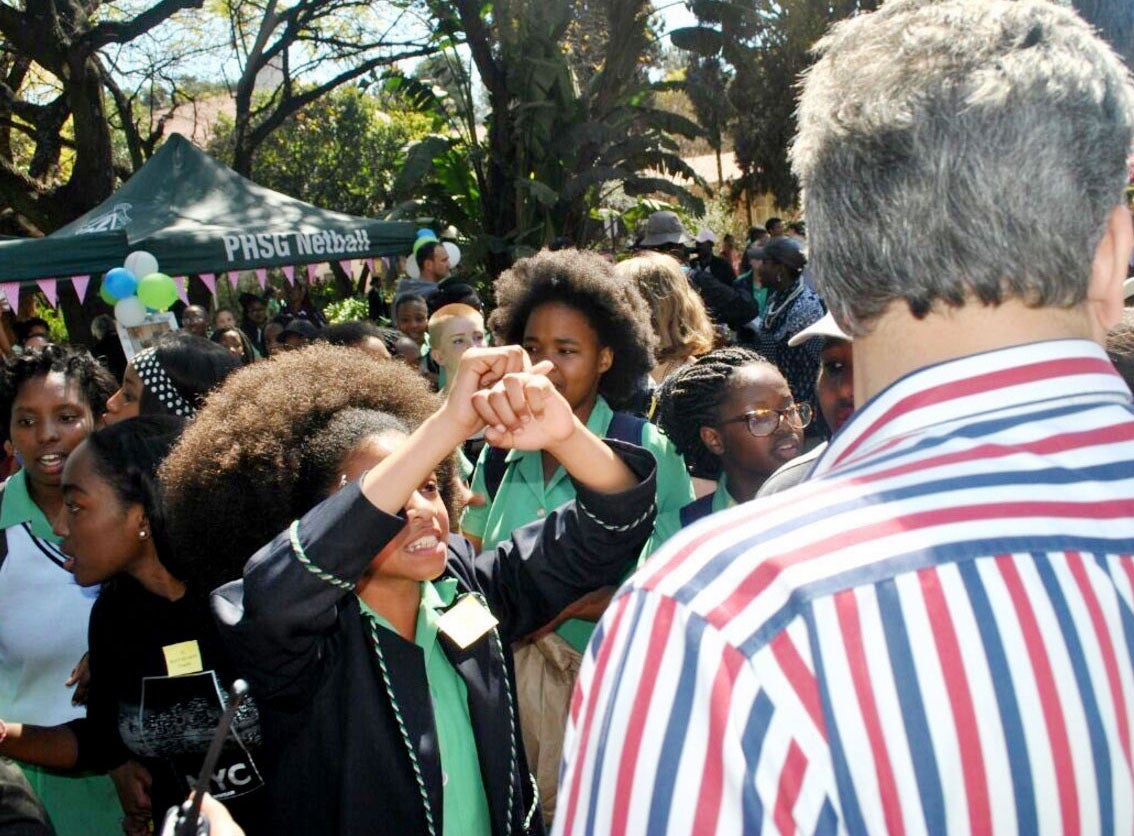
Editors Note: At the time of publication, the Gauteng Department of Education released a statement confirming the South African students at Pretoria High School were allowed to wear Afros after a racist hair rule that required Black girls to straighten their hair prompted protests. The department has also ordered an independent investigation into alleged racists incidents that have occurred at the school.
In the South African city of Pretoria — or Tshwane as it has been renamed to mark the new democratic dispensation — tensions are running high in one all-girls high school.
At first glance it seemed to be about hair and the ability to wear Afros as they please, but the Black girls who attend the school have made the country aware that it is about so much more.
At the time of writing, the #StopRacismAtPretoriaGirlsHigh hashtag had been trending since Sunday night, with people on social media, in articles and on the radio, expressing their views on what is the continued harassment and ill-treatment of the Black child in the South African education system. Pretoria High School for Girls has a code of conduct and dress code that could best be described as Christian conservative apartheid-era anti-blackness.
Over the weekend a group of young black girls staged a silent protest about the high school’s rules on hair. It took place at their annual fair, which the school uses to raise money. What happened next is what the furor is all about: the school called in the police, and that included guns and a K9 unit.
Dogs, guns, and a visible police presence — all for some little girls marching in silence to protest unfair and untenable school rules. The young girls faced the unsympathetic parents and school staff bravely, telling them “arrest us, arrest us all.”
@khayadlanga @MbuyiseniNdlozi @iamSivN @djsbu @simphiwedana @simamkeleD #StopRacismAtPretoriaGirlsHigh pic.twitter.com/DIbZBCx5zx
— SOUTH WESTERN GOD™ (@SiyaNtombela_) August 28, 2016
They brought guns for 14yr olds who don't want to relax their hair!!!!
— JustA (@JustADriveBy) August 28, 2016
Because conscious black girls are supposedly high risk #StopRacismAtPretoriaGirlsHigh
— Sweet Alyssum (@LeagoM__) August 27, 2016
The school’s inherently anti-black appearance regulations include: “All hair must be brushed.” But that poses a problem. If you know Black South African hair, it cannot be “brushed.” That’s just placing straight white hair as the standard.
“Cornrows, natural dreadlocks and singles/braids (with or without extensions) are allowed, provided they are a maximum of 10mm in diameter” and the list goes on.
The hair issue was actually a major part of the protest but also just the tip of the iceberg as the girls were also protesting their increasingly oppressive treatment at the hands of school staff. One young woman reports being told that her hair looks “like a nest” and another was harassed by fellow students (white girls) when she wrote an essay about woman empowerment, stating that Black women don’t have as many opportunities as white women.
I had to sit next to this racist for a year in Maths #StopRacismAtPretoriaGirlsHigh pic.twitter.com/nR42va2lrK
— Mishka (@ANicheOfLight) August 28, 2016
When my 8 year old godchild was told to "tuck in her bum" at school. I was seeing fire guys. I wanted to wring the principal's neck.
— Inkomo Emkileyo (@dlakza) August 28, 2016
She was also told, by her teacher, that her essay was racist and terrible, and was hounded by the white girls for a prolonged period. When she asked the teacher for help, the same teacher said that she’s now in high school so she must be strong. Others told the story of not being allowed to write exams if their hair was not to the staff’s liking. There are also stories of girls not being allowed to gather in groups because that would be seen as “conspiring.”
The Riotous Assemblies Act of 1956, in 2016 basically. https://t.co/KIH6VcRxp9
— Gugulethu Mhlungu (@GugsM) August 29, 2016
You have to wonder what year this is, what continent we live on.
At a meeting at the school Monday morning, Black children attending Pretoria Girls regaled the province’s MEC for Education, Panyaza Lesufi, with their terrible experiences at the hands of teachers and other members of staff. Most ended their stories in tears, to which Lesufi was moved to tell them that he’s with them and will support them.
WANT MORE FROM ESSENCE? Subscribe to our daily newsletter for the latest in hair, beauty, style and celebrity news.
What’s important about these young girls standing up for themselves is that they have chosen not to be treated in this manner any longer. Old Girls, the alumnae of the school, also came to show support. Many have said these girls, some as young as 13, have done what they could not do, even though they wanted to for so long.
There has to be changes across the board, as this problem is institutional and runs deep.
It’s sad to see that Black girls at the southernmost part of the African continent are going through so much of the same treatment as Black girls globally in this misogynistic anti-Black world.
Luso Mnthali is a Malawian freelance writer based in Cape Town focused on black female identity, arts and community. She’s written for Clutch Magazine, O the Oprah Magazine, OkayAfrica, Marie Claire, Cosmopolitan and New African Woman among others. She is also an editor at Afripopmag.com.